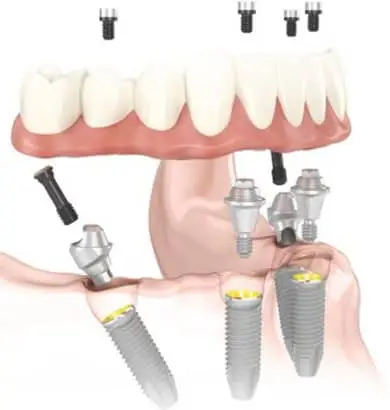I have lost some bone density but still want to switch to dental implants. I’ve seen two dentists. One of them has recommended I have a dental implant procedure called all-on-four and the other dentist wants to do two procedures— bone grafting and then the dental implants. Which should I do?
Duncan
Dear Duncan,

All-on-4 dental implants
First, I want to encourage you that you’re on the right path with your desire to switch to a dental implant procedure. The most important medical aspect is it will stop any further bone loss, which will protect you from becoming a denture cripple, unable to eat solid foods.
You’ll also find your quality of life goes up significantly. Even the best fitting dentures reduce your chewing capacity by 50%. Plus, with the loss of some bone density, you’ve probably noticed your dentures have started slipping. Eventually, as more bone is lost, they’ll start falling out.
This is because when your teeth are removed your body starts to resorb the minerals in your jawbone to use elsewhere in your body where it perceives they’d be more useful. This shrinking of your jawbone is known as facial collapse. As I said above, the implants will prevent that.
How All-on-Four Dental Implants Work
As you can see in the image above, the all-on-4 dental implants are placed at an angle in the posterior where there is usually more bone left. This helps avoid bone grafting in some cases. It can be very useful for patients who are candidates and want to avoid bone grafting. However, it has a downside. If one implant goes wrong, because they’re co-dependent, the whole unit will have to be replaced. The procedure was developed in the 1990s, so we don’t have as much long-term data on this as we do traditional dental implant procedures.
With bone grafting, you will have the bone in your jaw built back up. Then, after a healing time, you’ll be free to get traditional implant overdentures.
Whichever procedure you choose, make sure the dentist has done a large number of cases and has a good success rate. I would want a 98% success rate at a minimum.
This blog is brought to you by Atlanta Periodontist Dr. David Pumphrey.
With







